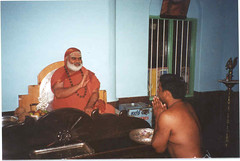The stability of the entire universe, in fact its very survival, is dependent on the operation of the law of virtue. The Lord Himself had declared in the Bhagavad Gita, ``With this (the divine constitution), you nourish the shining ones and may the latter illumine you. Thus nourishing one another, you shall reap the supreme good''. ``God has prescribed this moral law for humanity in the form of the Vedas which are His instructions for a life of purity.
A question that often troubles many is whether God can appear before us. If not, what is the meaning of divine grace. The fallacious answer provided by some in modern times is that the utterances of the ancient wisdom and of the divine mercy, appear to be concocted by a few to deceive the common man. As against this and to convince people of the merits of saints and of the Vedas, an appropriate reply has also been rendered as to what constitutes divine grace.
The beautiful verse in this respect says, ``God's blessings do not mean that He will go about with a staff in His hand as a shepherd does when he drives the animals to a meadow.'' This is to be understood as that He will bestow on us the proper motive for action. Every action we do is stimulated by an urge to perform it. Without such a spur, one does not act at all. The desire and the urge emanate from the Almighty's grace. If that be so, the sceptics will ask, why should not His grace be only for the performance of pious deeds and why should the urge to do evil acts arise?
This apparent riddle has been answered by Sri Bharathi Theertha Mahaswamigal of Sringeri Sarada Peetam. Urge for indulging in wicked deeds also is from the Divinity, he says. Does that mean that God's intention is that we can do such prohibited acts? If so, what sort of God is He is the next query? Does He, who is the object of our veneration and devotion, and whom we consider worthy of worship, goad us to perpetrate them?
The scriptures explain that one has to reap the consequences for the evil deeds done in one's previous birth. Because of this, God does not become responsible and He cannot be blamed. The succession of rebirths, wherein we ought to reap the consequences of our past actions continues from time immemorial. This concept of reaping the consequences of one's previous actions is neither improper nor unscriptural. Hence, those eager to procure God's grace and who want to please Him should abide by the law laid down by Him. He has given us the power of discrimination and it is for us to use it properly. A sword given by a father to his son for use in case of war, should not be instead utilised to chop off his own neck. If he does, is it the fault of the father or the son?
A question that often troubles many is whether God can appear before us. If not, what is the meaning of divine grace. The fallacious answer provided by some in modern times is that the utterances of the ancient wisdom and of the divine mercy, appear to be concocted by a few to deceive the common man. As against this and to convince people of the merits of saints and of the Vedas, an appropriate reply has also been rendered as to what constitutes divine grace.
The beautiful verse in this respect says, ``God's blessings do not mean that He will go about with a staff in His hand as a shepherd does when he drives the animals to a meadow.'' This is to be understood as that He will bestow on us the proper motive for action. Every action we do is stimulated by an urge to perform it. Without such a spur, one does not act at all. The desire and the urge emanate from the Almighty's grace. If that be so, the sceptics will ask, why should not His grace be only for the performance of pious deeds and why should the urge to do evil acts arise?
This apparent riddle has been answered by Sri Bharathi Theertha Mahaswamigal of Sringeri Sarada Peetam. Urge for indulging in wicked deeds also is from the Divinity, he says. Does that mean that God's intention is that we can do such prohibited acts? If so, what sort of God is He is the next query? Does He, who is the object of our veneration and devotion, and whom we consider worthy of worship, goad us to perpetrate them?
The scriptures explain that one has to reap the consequences for the evil deeds done in one's previous birth. Because of this, God does not become responsible and He cannot be blamed. The succession of rebirths, wherein we ought to reap the consequences of our past actions continues from time immemorial. This concept of reaping the consequences of one's previous actions is neither improper nor unscriptural. Hence, those eager to procure God's grace and who want to please Him should abide by the law laid down by Him. He has given us the power of discrimination and it is for us to use it properly. A sword given by a father to his son for use in case of war, should not be instead utilised to chop off his own neck. If he does, is it the fault of the father or the son?
-Sri Bharati Teertha Mahaswamigal

No comments:
Post a Comment